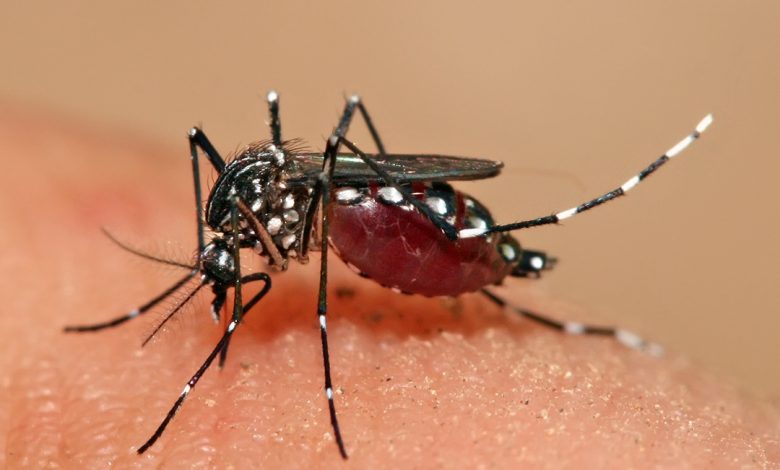

By Joachim Ng
Buntong resident M. Selarajoo is forced to spend RM50-RM80 a month buying insect repellents to keep out swarms of Aedes mosquitoes invading his home. As a 65-year-old retiree living on a shoe-string budget, he shouldn’t be having to spend money like this.
The mosquitoes are breeding in a storm drain filled with stagnant water that can’t flow because of massive blockage inside a manhole. Many city hall officials who have never stepped into a drain wrongly think that mosquitoes don’t breed in apparently dirty water. However, drains are a favourite breeding place as the water is clean to a mosquito and the larvae can hide at the bottom unseen.
Selarajoo complained to the Ipoh City Council and they informed the contractor in charge of drains in Buntong. Here’s what the contract workers did: they only pumped out water from the manhole and did not clear the drain.
A few areas in Buntong have reportedly suffered dengue outbreaks. All in, Perak has seen a rise of almost 20 percent in dengue cases in 2019 compared to 2018. This is not a light bite. In 2019, Malaysia recorded 130,101 dengue cases with 182 deaths. For comparison, COVID-19 registered 26,565 cases with 229 deaths as at 25 October 2020.
Dengue is second in terms of fatality, but first in terms of numbers infected. Although we will eventually beat COVID-19 with a vaccine coming our way, we are losing the dengue war as there is no vaccine being developed.
The primary reason for our defeat is that we have a three-tier governance structure and not a four-tier structure. We can’t defeat the Aedes mosquito because what is devoid in Malaysia is a neighbourhood government — the fourth tier. Governance of a nation is like driving a four-wheeled car. If your car has only three wheels, it won’t take you far.
Buntong is an example of what happens when there is governance at only three levels — federal, state, and local (meaning city council). The contract workers did not clear the drain as there was no city hall official or councillor present to give directions. They can’t be on site because they are stuck in faraway headquarters.
Neighbourhood problems are for neighbourhood committees to handle, because the committee members live in the neighbourhood and for the sake of their families they will devote themselves to the tasks. Being influencers, they can get the entire neighbourhood to cooperate.
What Selarajoo can do is to lobby for a town hall meeting where homeowners can state the reasons why the City Council should designate Buntong as a self-governing neighbourhood financed by a rollback of the property assessment taxes. The Council collected almost RM40 million in assessment taxes from 148,174 ratepayers during the first half of this year. There is no shortage of funds.
The neighbourhood committee should handle maintenance by hiring, monitoring, reviewing, and if necessary, firing the contractors who provide services to the neighbourhood such as cleaning drains, garbage removal, playground and walkway repairs, grass cutting, and the upkeep of neighbourhood roads.
To avoid politicking and corruption, annual elections should be held but candidates must not be members of any political party so that the committee is nonpartisan and immune to politics. The committee’s choice of contractors must be restricted to a list provided by Ipoh City Council to ensure that there is no favouritism. City Council must also conduct a yearly audit of the committee’s adherence to KPIs and SOPs.
What if the City Council declines to set up Buntong as a self-governing neighbourhood? Then Selarajoo must do what Panjang of Johor Bahru did: Panjang became a one-man neighbourhood committee undertaking repairs all by himself. He has become a legendary hero of the people down south, and has inspired many grassroot patriots to spring up in their own neighbourhoods up and down the country.
A 15-year-old Malay boy in Petaling Jaya walks around his residential estate using a pointed stick to lift up face masks thrown at the sidewalks by uncaring users. In Butterworth, an Indian husband-and-wife team uses a garbage picker to collect face masks thrown at roadsides. In Subang Jaya, a Chinese resident has been going around on a motorbike organising gotong-royong campaigns to clear litter and mosquito breeding spots.
These four shining examples tell you that the ordinary people of Malaysia regardless of their ethnicity are capable of governing their neighbourhoods better than any city council.
There has to be some push to obtain self-governing status for your neighbourhood and all neighbourhoods, as a high index of Aedes mosquito breeding also leads to the spread of Chikungunya virus. Chikungunya infection numbers have gone from a low double digit in 2019 to a high triple digit this year. Kinta, Kampar, Larut, Matang and Selama are some of the affected localities.
As for dengue, the number of cases jumped 23 percent in Perak during the first half of this year compared with the corresponding period last year.
=========================================
Get your local news fast. Download the Ipoh Echo App on your mobile. Available on both Google Playstore and Apple Appstore.


